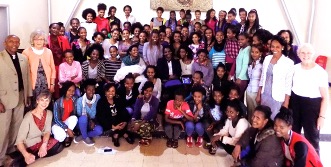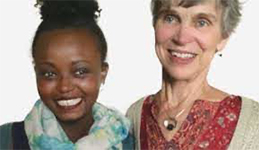Saving the Planet by Kathleen Coskran (Ethiopia)
Saving the Planet
By Kathleen Coskran (Ethiopia 1965-67)
The title of the Westminster Town Hall Forum in Minneapolis was “Can We Save Our Planet?” The speaker, Carl Pope, former Executive Director and Chairman of the Sierra Club, was asked, “What can we do to halt the population explosion that threatens the planet?”
Pope’s answer: “Educate girls.”
I nearly jumped out of my chair to shout, YES!
I had recently returned from Addis Ababa, Ethiopia, where I attended a gathering of 130 girls and young women, some still in secondary school, and others who had been able to finish secondary school and go on to college and university because of Resources for the Enrichment of African Lives (REAL, real-africa.org).
REAL was founded by Tsehai Wodajo, from Nedjo, Ethiopia. Tsehai knew first hand what it took to keep a girl from a poor family in school. In 1970, 8th grader Tsehai wrote a letter to a young Swedish Volunteer in Nedjo, Eva Nordin, asking for help to stay in school. Eva was impressed with the letter from the determined young Tsehai, particularly her strength of character and desire to get an education. Eva, 21 years old, was at University herself, but because of generous financial support from the Swedish government, she felt she had sufficient resources to help Tsehai stay in school. After she returned home, Eva sent Tsehai 5 Swedish Krona every month–25 Ethiopian Birr– which enabled Tsehai to finish high school in a town far from home (there was no secondary school in Nedjo) and to buy what she needed–soap, toiletries, and school supplies, some of which she sold on the side to make a small profit. The two young women regularly wrote to each other until the revolution that deposed Emperor Haile Selassie made foreign correspondence nearly impossible.
Tsehai had a BA from Addis Ababa University when she arrived in Minnesota in November 1990. She began graduate school in Social Work at Augsburg University and, in 1994 had the good fortune to be assigned Ann Jensen as her field supervisor.
Ann had taught mathematics as a Peace Corps volunteer in Bahar Dar, Ethiopia (1964-66, Ann Chartrand then). At that time only 10% of Ann’s 9th and 10th grade students were girls. Her most promising student, Almaz, was forced by her parents (who were very poor) to quit school to get married. Almaz begged Ann to help her, but there was nothing Ann could do. Ann never forgot Almaz and resolved to find a way to help girls like Almaz realize their dreams of an education.

Three graduates of the REAL program who have completed university and are now working, making a presentation at this year’s REAL gathering in Addis Ababa. Dr. Tsehai on the left is a physician in Hosanna, Ethiopia. The other two are REAL graduates from REAL’s Entoto site. They complete university after graduating from REAL and are both working as Construction Engineers.
When Tsehai told her of her ideas to help African girls complete their education, Ann was ready to help girls in ways that she couldn’t help Almaz. In early 2004, Tsehai and Ann traveled to Ethiopia to further develop how people, in the United States, could best assist in the education of girls there. After meeting with Ethiopian leaders and local school staff, Tsehai and Ann knew what they wanted to accomplish and what was needed to achieve their goals.
Back in the United States, they worked together to form a structure for REAL based on resources readily available in Ethiopian communities. This structure continues today. At each site a local woman, trained and hired by REAL as a mentor, meets regularly with the 15 or 20 girls in the local program to offer support, advice, and encouragement–whatever is needed. Each girl receives a monthly stipend from REAL and is expected to open a savings account. This stipend includes money for her family, so there is an incentive for the family to encourage their daughter to continue in the REAL program.
To find financial support for this new, exciting program, Tsehai and Ann made presentations to church groups, Rotary clubs, and other organizations, and, by fall of 2004, they had found sponsors for 15 girls (at $360 a year) and for the mentor (at $1400 a year) to open an initial site in Nedjo.
When Kathleen Moore (PCV Endeber, Ethiopia 1965-67) heard about REAL, she immediately became became a sponsor and also traveled to Ethiopia with Tsehai on her annual trip in 2009. Kathleen stayed on in Ethiopia from June through September of that year to work with REAL girls to improve their English language and study skills. My husband Chuck and I (Ethiopia 1965-67) became sponsors in 2010, and I joined the REAL board shortly after that.
Tsehai chose the title carefully: Resources for the Enrichment of African Lives–not just girls’ lives and not just Ethiopian lives. The model is carefully structured, simple and workable. At each REAL site the mentor relies on the local community to identify the girls with the greatest need and potential for success. They all work within the existing school framework, and make sure the girls have the resources and the experience to continue their education when they graduate from REAL in the 12th grade.
Families and communities are changed when girls are educated. In one site, the elders of the community–all men–now say that education for girls is worth it because they are so proud of them.
The pandemic and recent political unrest, particularly in western Ethiopia where 5 of REAL sites are located, created extra challenges. However, even when schools were closed, the girls met with their mentors and continued their studies as best they could.
And why did Carl Pope say that educating girls would slow the population explosion that threatens the planet? Because when a girl gets at least seven years of education, she marries four years later than average and has two fewer children–and, because she is more likely to survive giving birth, she makes sure her children are educated. (Complications from pregnancy and childbirth are the leading cause of death in young women aged 15 to 19 in developing countries.
REAL has now helped more than 500 girls and is growing. After REAL’s first conference with girls from all the sites, the girls realized they were part of something bigger. One girl said, “WE are not poor. We have a vision.” Another said, “In this conference I learn that woman is not less than man.”
Education empowers capable, articulate girls, girls with a future–and just might save the planet.
The link to the video: https://youtu.be/g-l-

2017 Gathering of current REAL girls and graduates from each of the 8 REAL sites. I am seated on the floor on the left; Tsehai Wodajo, also seated, is the 3rd person on my left; Ann Jensen, standing, is in second row on far right. The other adults in the picture are either members of the local committee or mentors.
Kathleen Coskran taught English and math in Addis Ababa and Dilla, Ethiopia, and spent two years with her husband, Chuck, a PCV in Ethiopia, and then an APCD in Kenya. Her first book, The High Price of Everything, winner of a Minnesota Book Award in 1988, includes stories set in both Ethiopia and Kenya. She is primarily a fiction writer, but is currently working on a collection of essays.

Kathleen, brings to REAL her passion to educate girls and her love of writing. She has been a bord member and vis President of REAL for several years. I appreciate her for sharing the work of REAL (Resources Enriching African Lives) with this dedicated group of people. Let us continue to stand for a better and just world.
Tsehai
Thank you for a REAL report, Kathleen. The work that you, Chuck, Ann Chartrand Jensen, Kathleen Moore, and others did for Ethiopian girls is truly amazing–and in the best spirit of the Peace Corps. Congratulations, and Keep up the great work! Ted Vestal